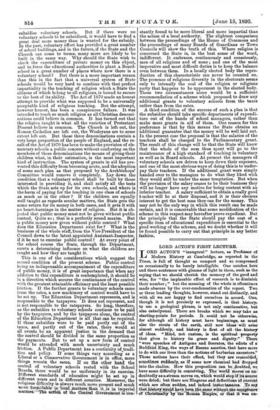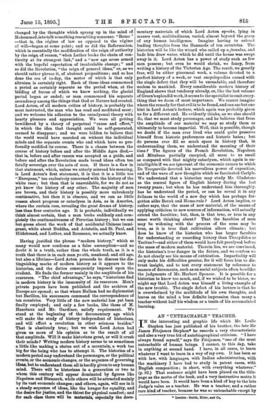LORD ACTON'S FIRST LECTURE.
ORD ACTON'S "inaugural" lecture, as Professor of Modern History at Cambridge, as reported in the Times, is full of thought so compact and so compressed as occasionally to be barely intelligible. One catches here and there sentences with gleams of light in them, such as the saying that we should cherish the memory of the good and wise, for " the implacable effect of research is to diminish their number ; " but the meaning of the whole is oftentimes made obscure by the over-condensation of the report. Two or three leading thoughts, however, stand out distinctly, and with all we are happy to find ourselves in accord. One, though it is not precisely so expressed, is that history, to use a geological phrase, is not only continuative, but also cataclysmal. There are breaks which we- may take as starting-points for periods. It could not be otherwise, for although all history must have beginnings, as must also the strata of the earth, still new ideas will arise almost suddenly, and history is first of all the history of ideas. " Mind, not custom, is the spiritual property that gives to history its grace and dignity." There "were speeches of Antigone and Socrates, the edicts of a Buddhist King, the ways of Essene ascetics, that have more to do with our lives than the notions of barbarian ancestors." Those notions have their effect, but they are remoulded, sometimes Suddenly, as if some new chemical had dropped into the chalice. How this proposition can be doubted, we have some difficulty in conceiving. The world moves on un- doubtedly as a stream moves on, which would stop if its source were dried; but there are Niagaras and deflections of current which are often sudden, and indeed instantaneous. To say that hister7179sld 4ave been theisame withpnt the accopance of Chriitianiiy 'the hltonien Empire,. or that it was tin- changed by the thoughts which sprang up in the mind of Mahommed, is to talk something resembling nonsense. "Rome —that is, the regime of law as opposed to the regime of will—began at some point; and so did the Reformation, which is essentially the modification of the reign of authority by the reign, of reason, "when Luther broke the chain of con- tinuity at its strongest link," and a " new age arose armed with the hopeful expectation of incalculable change ; " and so did the Revolution, "the reign of general ideas," or, as we should rather phrase it, of abstract propositions ; and so has done the era of to-day, the motor of which is that only altruism is certainly right. Each of those ideas commenced a period as certainly separate as the period when, at the bidding of forces of which we know nothing, the glacial period began or ended ; or man commenced his separate ascendency among the things that God or Nature had created. Lord Acton, of all modern critics of history, is probably the most instructed, the man who has read and meditated most ; and we welcome his adhesion to the cataclysmal theory with hearty pleasure and appreciation. We were all getting bewildered by a theory of perpetual " cause and effect," in which the idea that thought could be self-generated, seemed to disappear; and we were bidden to believe that the world would have marched on without the individual minds and the separate events who and which have so pro- foundly modified its course. There is a chasm between the course of history before and after the Middle Ages died,— that is, before and after reason was accepted as a guide, and before and after the Revolution made broad ideas often too fatally sovereign over the acts of men. If there is a flaw in that statement, which, unless we utterly misread his meaning, is Lord Acton's first statement, it is that it is a little too "European," too exclusively concerned with the history of the white race ; but then that is unavoidable, for we do not as yet know the history of any other. The majority of men are brown, and their history is possibly more unbrokenly continuative, but then it is obscure, and we can as little reason about progress or cataclysm in Asia, as in America, where the curtain rose, revealing the great drama of history, less than four centuries ago. It is probable, individually we think almost certain, that a man broke suddenly and com- pletely the continuativeness of Peruvian history ; but we can but guess about the work of that accidental Chinese immi- grant, while about Buddha, and Aristotle, and St. Paul, and Hildebrand, and Luther, and Rousseau, we actually know.
Having justified the phrase "modern history," which so many would now condemn as a false assumption—and no doubt it is a truth, rather than the whole truth, as it is a truth that there is in each man yo nth, manhood, and old age, but also a lifetime—Lord Acton proceeds to discuss the dis- tinguishing marks of modern history as it appears to the historian, and the duties consequently imposed upon the student. He finds the former mainly in the amplitude of his resources. "The chief advantage," he says, "historians find in modern history is the immensity of its resources. Men's private papers have been published and the archives of Europe are opened; so that where Hallam had no diplomatist but Barillon, his successors command the correspondence of ten countries. Very little of the new material has yet been finally employed; and only a few books, like those of M. Hanotaux and Mr. Gardiner, satisfy requirement. We stand at the beginning of the documentary age which will make the study of history independent of historians, and will effect a revolution in other sciences besides." That is absolutely true ; but we wish Lord Acton had given us more of his opinion as to the result of all that amplitude. Will it make historians great, or will it crush their minds P Writing modern history seems to us sometimes a little like making a statue out of a mountain, a work too big for the being who has to attempt it. The historian of a modern period may understand the personages, or the political events, or the economic changes, or the sequence of governing ideas, but to understand them all is hardly given to any human mind. There will be historians in a generation or two to whom this century will appear dominated by figures like Napoleon and Bismarck, while others will be attracted mainly by its vast economic changes ; and others, again, will see in it a steady sequence of ideas, like the hunger for equality, and the desire for justice, and the thirst for physical comfort; and for each class there will be materials, especially the docu- mentary materials of which Lord Acton speaks, lying in masses vast, multitudinous, varied, almost beyond the grasp of any human intelligence. Imagine having to extract leading thoughts from the Hansards of ten countries. The historian will be like the wizard who called up a famulus, and bade him draw water, which he did until the house was swept away in it. Lord Acton has a power of study such as few men possess ; but even he would shrink, we fancy, from writing a history of the Victorian Age. The result, we greatly fear, will be either piecemeal work, a volume devoted to a
perfect history of a week, or vast encyclopedias cursed with the single defect that they will be unreadable, and therefore useless to mankind. Every considerable modern history of England shows that tendency already, or, like the last volume of Green's splendid work, it seems to the specialist to omit every- thing that we deem of most importance. We cannot imagine where the remedy for that evil is to be found, and can see but one hint in Lord Acton's lecture, which again was probably given us for a different end. He evidently thinks, as we also should do, that we must study personages, and he believes that from the amplitude of our material we may so study them as ultimately to become impartial. Well, that is possible, though we doubt if the man ever lived who could quite preserve himself from historic preferences and historic hates ; but do persons ever fill so much space in history that, in understanding them, we understand the meaning of their time ? The figures of the French Revolution, Napoleon and Mirabeau partially excepted, all seem to us small as compared with that mighty cataclysm, which again is un- intelligible if we are ignorant of the economic causes to which De Tocqueville devoted his marvellous power of exposition, and of the wave of new thoughts which so fascinated Carlyle. We understand that a historian may study Mr. Gladstone as the central figure of English history during the last twenty years ; but when he has understood him thoroughly, has he understood the period, or can he reveal it in any fullness to the world of a new day which has perhaps for- gotten alike Batuk and Home-rule ? Lord Acton implies, or rather says, that the mass of new material, of the means of applying criticism to new sources of information, will actually extend the faculties ; but, then, is that true, or true in any sense worth thinking about? That the faculties of man may be widening with the process of the suns may be true, as it is true that cultivation alters climate ; but does he know of the historian who has larger faculties for understanding or recording history than Thucydides or Tacitus ?—and either of them would have felt paralysed before the mass of modern material. Therein lies, we are convinced, the historian's true danger in the future, and we confess we do not clearly see his means of extrication. Impartiality will only make his difficulties greater, for it will force him to dis- trust insight, and to test every statement by reference to masses of documents, such as on social subjects often bewilder the judgments of Mr. Herbert Spencer. It is possible for a historian to know too much, and, if we wished to be bitter, we might say that Lord Acton was himself a living example of the new trouble. The single defect of his lecture is that he is overwhelmed by the multitude of his own thoughts, and leaves on the mind a less definite impression than many a teacher without half his wisdom or a tenth of his accumulated learning.



































 Previous page
Previous page